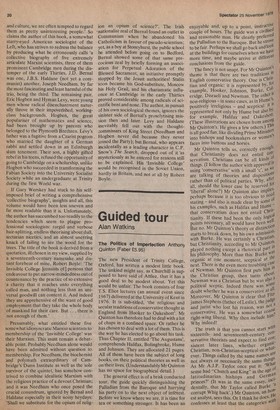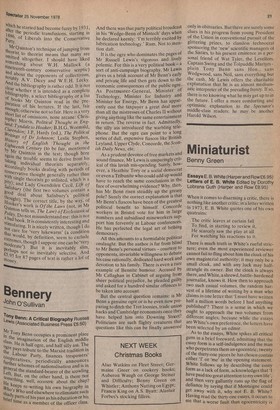Guided tour
Alan Watkins
The Politics of Imperfection Anthony Quinton (Faber £5.95) The new President of Trinity College, Oxford, has written a modest little book. The unkind might say, as Churchill is supposed to have said of Attlee, that it has a good deal to be modest about. Yet this would be unfair. The book consists of four T.S. Eliot lectures (an annual event since 1967) delivered at the University of Kent in 1976. It is sub-titled, 'the religious and secular traditions of conservative thought in England from Hooker to Oakeshott'. Mr Quinton has therefore had to deal with a lot of chaps in a confined space. Or rather he has chosen to deal with a lot of them. This is the way he has elected to go about his task. Thus Chapter II, entitled 'The Augustans', comprehends Halifax, Bolingbroke, Hume and Johnson. They are allocated 21 pages. All of them have been the subject of long books, on their political theories as well as on their lives. (Understandably Mr Quinton has no space for biographical detail.) The general effect is of a brisk conducted tour, the guide quickly distinguishing the Palladian from the Baroque and hurrying his party on to the next object of interest. Before we know where we are, it is time for tea or something stronger. It has been an enjoyable and, up to a point, instructive couple of hours. The guide was a civilised, and reasonable man. He clearly preferren the Palladian to the Baroque. But he strove to be fair. Perhaps we shall go back and look at the buildings for ourselves when we have more time, and maybe arrive at different conclusions from the guide. The fancy is not unapt. For Mr Quinton's theme is that there are two traditions English conservative theory. One is Christian and organic: it is represented by, 1. example, Hooker, Johnson, Burke, COI,eridge, Disraeli and Newman. The other is non-religious in some cases, as in Hume's,' positively irreligious — and sceptical: it IS represented not only by Hume but also by' for example, Halifax and Oakeshott. (These illustrations are chosen from ain0,11! Mr Quinton's. He gives a few others.) Tu'' is all good fun, like dividing Prime Ministers into bishops.and bookmakers or women's faces into buttons and horses. Mr Quinton tells us, correctly enough' that Christianity does not entail eon: servatism. Christians can be all kinds 0' things. (I follow the author with approval in using 'conservative' with a small 'c', as We are talking of theories and dispositions rather than of political parties. Why, after all, should the lower case be reserved for `liberal' alone?) Mr Quinton also imPliesci perhaps because it is too obvious to nee stating — and also is made clear by Some his examples, such as Halifax and Hume,: that conservatism does not entail China! tianity. If these had been the only logic,' points necessary, all would have been We"' But no. Mr Quinton's theory or distinction starts to break down, by his own admissit° with Burke. He was certainly a Christi° but Christianity, according to Mr Quinton, played nothing except a rhetorical part i? his philosophy. More than this: Burke vin' organic at one moment, sceptical at the next. There is the even more troubling ease. of Newman. Mr Quinton first puts hint I° the Christian group, then turns about. Newman was a Christian but he was a40 political sceptic. Indeed there was soril,e doubt whether he was a conservative at Moreover, Mr Quinton is clear that Fiti" james Stephens (father of Leslie), the jud4c. and jurist who lost his reason, was tiot conservative. He was a somewhat coarse, right-wing liberal. Why then include hinl' Why indeed! The truth is that you cannot start With sixteenthand seventeenth-century e°11servative theorists and expect to find con: sistent later lines, whether organic' Christian, non-Christian-sceptical or whatever. Things called by the same names ate not always or necessarily the same things; As Mr A.J.P. Taylor once put it: `Wilaf sense had "Church and King" in the age ° latitudinarian bishops and Gertnan. princes?' (It was in the same essay, inci: dentally, that Mr Taylor called Burke ." corrupt Whig hack'.) Mr Quinton, an honest analyst, sees this. Or I think he does. fle," confesses at least that the categories WItis Which he started had become fuzzy by 1931, nen'. the periodic transfusions, starting i . n Party. of Liberals into the Conservative rarty.
theorist Quinton's technique of jumping from tneorist, to theorist means that many are omitted altogether. I should have liked something about W.H. Mallock (a inneteenth-century conservative sceptic) and about the opponents of collectivism, notably A.V. Dicey and W.E.H. Lecky. And the bibliography is rather odd. It is not c1,ear whether it is intended as a complete blbliograpa select bibliography or a list of books Mr Quinton read in the preParation of his lectures. If the last, fair enough; otherwise not so fair. Here is a very Short list of omissions, none arcane: Christopher Morris, Political Thought in England: Tyndale to Hooker; B.H.G. Wormald, Writings J.P. Hardy (ed.), The Political wyings of Dr Johnson; Leslie Stephen, I!istory of English Thought in the tbighteenth Century (to be fair, mentioned M, r Quinton in the text; though here again the trouble seems to derive from his taking individual theorists separately; accordingly books dealing with periods of ce.nservative thought generally rather than an With single theorists go unlisted, which is a Pity); and Lady Gwendolen Cecil, Life of Salisbury (the first two volumes contain a good deal about Salisbury's political thought). The correct title, by the way, of Hooker's work is Of the Laws (not, as Mr Quinton tells us, The Law) of Ecclesiastical °IitY. Do not misunderstand me: this is not a bad book. It is consistently interesting and stimulating. It is nicely written, thoughIdo not care for 'very lukewarm' (a condition that would, by definition, seem to exclude extremes, though I suppose one can be 'very Moderate). But it is inevitably slim, Perhaps not o inevitably selective. And 4-95 for 87 pages of text .is rather a lot of Money,



































 Previous page
Previous page